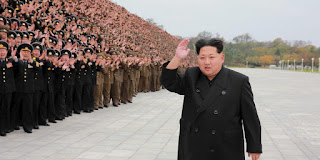Don't Be Fooled by North Korea
October 5th, 2007. President Roo Moo-hyun and Supreme Leader Kim Jong II have signed a peace agreement declaring their intentions to end the Korean War. Earlier that year, North Korea signed an agreement with several other major powers - China, Russia, the United States, Japan, and South Korea - committing to denuclearizing the Korean peninsula. Yet, just a year earlier, North Korea had detonated its first nuclear weapon. Does this sound familiar? It should - because practically the exact same thing has played out over the course of 2017-2018.
North Korea claimed to have tested a hydrogen bomb in September of 2017. It spent much of 2017 hurling missiles in the general direction of Japan and threatening the US with nuclear annihilation. Tensions were extreme on the Korean peninsula. Then, after staying relatively quiet for a few months, North Korea signed an agreement with South Korea - an agreement that was a complete and utter reversal of the past year.
So what will happen next? Likely, North Korea won't do much for the next year. 2008 was relatively quiet - though this could have been due to the global firestorm of the financial crisis. But there are no guarantees for the future. In 2009, North Korea launched a long-range rocket over the Pacific Ocean. In 2010, North Korea torpedoed a South Korean warship, resulting in the death of 46 sailors. Later in 2010, North Korea shelled a South Korean island. 2011 saw the death of Kim Jong II, but 2012 saw the continuation of long-range missile tests, and a North Korean satellite was placed into orbit by the end of the year. In 2013, North Korea tested a third nuclear weapon, and the events of 2016-2018 are both recent enough and threatening enough that I need not mention them.
In 2007, the United States made the critical mistake of easing pressure on North Korea - giving into North Korea's ultimate goals in foreign policy. When North Korea flashed warning signs of reversing back to its previous aggressive, belligerent course, we ignored them, for fear of "weakening the deal". Over time, the US concerned itself with other manners - Iran, Iraq, Crimea - and turned a blind eye to North Korea over the next several years. During this time, North Korea built itself back up, with North Korea's GDP growth flipping from -1% annually to 2-4% annually. It garnered enough resources to begin building ICBMs and hydrogen bombs, and now the US has lost even more leverage over North Korea.
But why is Kim Jong Un doing this? Why keep cycling from aggression to charm and back again? I've talked about it before, and I will reiterate. Kim's ultimate wish is to stay in power, but he also wants to develop North Korea. However, if he opens up too much - converting North Korea to a free market society, for example - he is exposing himself to revolution, as the people will ultimately demand more and more. The best way to develop, therefore, is to force himself onto the global stage with intimidation - also known as nuclear weapons. However, in order to reap the rewards, he can't be belligerent, but instead charm the world into thinking that he has changed. Overall, an aggressive stance puts North Korea in the position to gain. Charm, detente, and passivity collects the gains.
Yes, the progress made by North and South Korea in late April is an overall positive step. However, we cannot afford to begin to ignore North Korea. We must maintain the pressure on the North, and keep our eyes peeled for any aggressive actions. If the US eases up now, North Korea will continue to strengthen, become an even greater threat to the west and global peace, and ultimately we will repeat the entire cycle again. Giving into North Korea's demands is the last thing that the US can do - instead, keeping the sanctions and pressure on North Korea is vital.



Comments
Post a Comment